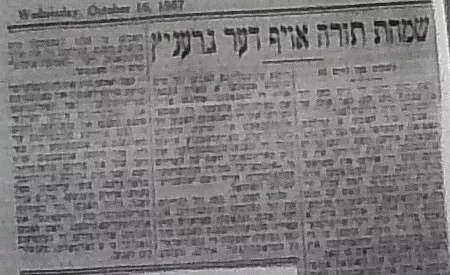A Cry of Longing, Not of Despair!
By: Yaakov Rosenfeld
The roads of the city were full.
On Rosh Hashana, the holy courtyards were filled with people. During the Days of Awe (the Rosh Hashana and Yom Kippur period), anyone who walked around the centre of Jerusalem could not contain their shouts of admiration. Thank G-d, the streets of the city were filled with tens of thousands of chassidim and influential men, their faces shining like the brightness of the sky: they were privileged to ascend, to see, and to be seen.
One cannot even count the groups of chassidim who have gathered at the pure tables, there is no one to prepare for them, and there is no material, in the foreign and Christian world who would feel even a little of the upliftment of spirit and soul that is the lot of hundreds of thousands of chassidim, the elderly with the young, young with adults, who crowd the centre of chassidism throughout the Land of Israel and the Diaspora countries – America and Europe – during the Days of Mercy and the feasts of joy.
Hearts pray that the people of Israel will rise and flourish, that the great and righteous of the generation will live long in health and joy, and that the world of Torah and chassidism will continue to flourish and grow until the coming of our righteous messiah speedily in our days, and this is the time to remember completely different times. Not so far from us. There are still among us who remember them.
Days Gone By
It is time to remember those days now, exactly eighty years ago, during the first “Yare’ach HaEitanim” (the month of Tishrei) after the destruction of the Jewish people in Europe. At that time, the Holocaust survivors were scattered and dispersed throughout the devastated and destroyed world, and they were very confused. At that time, many wise people were certain that what had been was no longer what it would be, and that this wonderful world of Torah, fear of G-d, and chassidism – its light had gone out forever and would never shine again.
Were there many who believed then that Tishrei 5706 (1945) would look the way it does now? No. Most of the people did not believe, but we will forever remember those who did, those who fought tooth and nail to build the new world, those who, just a few months after the liberation, searched for the four species (lulav and etrog, i.e. palm frond, willow, myrtle, and citron) as they searched for relatives and survivors. There were those who rejoiced about a lone etrog that had arrived by a strange route to the camp and waited in line to be allowed to fulfill the mitzvah. Those who, among the ruins of Warsaw, erected a dilapidated sukkah and sat in it with unsurpassed joy, even though they smelled the danger of Polish antisemitism and knew that it the Poles’ souls.
We will forever remember those whom the unforgettable Rabbi Moshe Prager called with admiration: “those who never yielded.”
In our archives at Ganzach Kiddush Hashem, thousands of old, yellowing pages lie still. These pages lie on top of each other, folding testimonies and memories within them. They are testimonies of those heroic survivors who, on the first Sukkot holiday after the liberation, in 5706, eighty years ago, could have sunk into despair and given up everything, but they chose life, and they fought. And today, anyone who wanders around during this period in the heavily charedi (utra-Orthodox) areas in Israel and around the world knows that there is nothing natural about what is happening before their eyes. We are walking miracles, by the grace of G-d and the merit of our ancestors.

“Simchat Torah on the Border” – Testimony from the first holidays following liberation, Ganzach Kiddush Hashem archive

“The Dangerous Sukkah” – Testimony of a Holocaust survivor about the first sukkah among the ruins of destroyed Warsaw, Tishrei 5706, Ganzach Kiddush Hashem archive
5706, A Visit with the Destroyed World
A short time after the war, Moshe Ron visited the town of Gur. Moshe Ron was one of the greatest Jewish journalists in Israel and the world. He left a strong mark on the world of writing and editing, and every year on the anniversary of his passing, the “Ron Prize” is awarded in his memory to selected journalists. Moshe Ron, whose name does not mean much to the younger generation today, founded the Press Council, the Editors’ Conference, and the Sokolov House. In the past, he was a Jew who was fortunate enough to have known Polish Jewry, and his writing was sometimes mixed with warm tears about the wonderful Jewry that was and is no longer.
Visiting the town of Gur, immediately after the war, was clearly not an easy experience for Moshe Ron. He knew what Gur was like in the good old days, and saw its ruin. Moshe Ron did not believe that this chassidism would ever flourish and blossom, he did not believe that Gur would ever light up the world. Here are excerpts from Moshe Ron’s writings, after his visit to the ruined town of Gur, shortly after the Holocaust.
He begins:
“I returned from a large Jewish cemetery. A vast Jewish burial ground whose arms embrace an entire country. I returned from Poland and I am still in a state of mental weakness, and the weakness that has gripped me does not let go.”
“I returned from a tour of the ruins of a vibrant and spiritually rich Jewry that has flourished for generations and enriched the land of the Diaspora with immense treasures of Jewish tradition and world values (…)”
“There are no embers there today, sheltered from the fire of hell. There is also no memory of the greatness of the soul, the treasures of faith, and the elation of the spirit of Polish Jewry before the axe of extermination was raised against it.”
“It turned, went, the light of the seven days was hidden. Down the drain went the endearing, warming, and illuminating chassidism of Judaism in Poland – this is the chassidism that breathed life into the Torah, faith, and mitzvahs, and made Judaism the domain of the woodcutter, the shoemaker, the butcher, the tailor, and the water carrier (…)”
“There is no chassidism. And it is sad and mournful and desolate without it. For not only did faith sow, and not only did it bring confidence, commandments and good deeds, and love of man on its wings, but also, and perhaps this is its main merit, a joy of life that stole into the gray mask of life; cheerfulness and joy into the meager homes, into the life of desolate poverty and gloomy deprivation.”
Yes. Moshe Ron eulogizes chassidism, which he says is dead. He cries bitterly over it. Moshe Ron was right then. And who thought otherwise? Who believed that chassidism would be alive, happy, and vibrant and that hundreds of thousands would fill its halls with joy?
Continuing his article, Moshe Ron describes life in Gur before the war. He describes, with great skill, all the “comings and goings” in Gur. The trip on the “Koleika” (i.e. the tram – “The commotion is great and immense, although the Polish Ministry of Transportation had long ago prepared itself to anticipate the onslaught on the trains going to Gur. From every possible place, carriages and locomotives were diverted to the track leading to the Rebbe’s town. Dozens of such carriages and their locomotives have already made their way to Gur, and the station is still bustling with people until it seems as if the flow is never ending, it is like a spring that is surging”).
He describes with an artist’s hand the atmosphere in the holy court, the atmosphere of the holidays and the High Holidays. He expands on a fascinating point: the absence of class distinctions in the courtyard of the Gur Rebbe, and also on the journey to him. Everyone is equal, everyone is united, happy, and cheerful. He tells of the bustling inns, of the crowd, most of whom remain in town even days after the holiday is over, of the “eyes veiled with tears of joy after beholding the glory of the holy face, after offering supplication and request and meriting the Rebbe’s blessing.” He describes Rosh Hashanah, Yossel Chencziner, the prayer leader, Leibel Meyers, the leader of the Shacharit prayer, and Yankel Talmud, the conductor of the choir. He expresses in magical words a burning longing for the moment of saying “Shana Tova” to the Rebbe:
“The greatness and vastness of the experiences of the great day. Everything speaks of the grandeur of holiness and the splendour of greatness, the Rebbe stands on his stand and the multitudes of his followers, admirers, and people who love him pass by him in order to receive the great mitzvah: to bless the Rebbe with a ‘shana tova’; to pause for a moment of nothingness in his warm, caressing hand, and to hunt in his wise and deep eyes for the fleeting glance of the slightest attention”…
“It is not good without the Jews”
And now, the writer Moshe Ron is in Gur after the Holocaust and his eyes are teary. With the help of some senior journalist from Argentina, his colleague in the World Press Organization, he managed to arrange for himself an entrance and a tour of the holy court of Gur, and his description is so sad, so mournful, so heartbreaking. He is crying, and tears are also flowing from the reader’s eyes, and they are right, the crying was as justified as can be, but not a cry of despair as Moshe Ron’s writing expresses, Moshe Sharett forced him to Hebrewize his family name Danzigerkaron to the new Hebrew name, not a cry of despair because chassidic Jews do not know what despair is. If Moshe Ron had believed that the chassidism he so eulogized would look the way it does in eighty years, it is doubtful that he would have spoken like this, it is doubtful that he would have acted as he acted.
Moshe Ron writes about the empty koleika, about four yawning and bored old Polish men who frolic in it, longing for the good times and exclaiming with sadness and longing: “It’s not good without the Jews”…
He tells of the old doorman Evarist Witushevsky, who was still there in the good old days, who wept uncontrollably, tears of longing and sadness. He writes about a man named Viktor Akimov, a film technician, whom the Gestapo commander ordered to screen films every evening in the Rebbe’s private room and to prepare other things there that should not be written down. Akimov shuddered and cleverly torpedoed the terrible project. He claimed that the Rebbe’s room had pillars that could interfere with the movie experience… The Nazi was convinced, and the idea was dropped.
Ron tells of the Rebbe’s beit midrash (study hall) filled with crates of beer, of the library that was filled with thousands of volumes, of the pure chassidim who crowded the entrances of the building that now serves as a Polish brewery. Tears flowed from Moshe Ron’s eyes when he saw the well from which the Rebbe drew water to bake matzah, and from which the priests washed their hands before the priestly blessing. The gentiles surrounded Moshe Ron sadly and asked: “Where have those times been taken to?”…
The article is quite long, and the ending is also gloomy and discouraging:
“20 kilometre train ride, back to Warsaw. Another 30 minutes of hustle and bustle. This time I can’t see the view, the tears are in the way…”
Who would have believed then, eighty years ago, that other times would come. But there were those who believed, there were those who fought, and they deserved glory.














